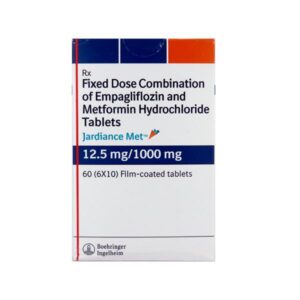METFORMIN + EPAGLIFLOZIN
Metformin: Metformin is an oral medication commonly prescribed for the treatment of type 2 diabetes. It belongs to a class of drugs called biguanides. The primary mechanism of action of Metformin is to decrease the amount of glucose produced by the liver and improve the body’s response to insulin.
Metformin is used to control blood sugar levels in individuals with type 2 diabetes. It is usually prescribed in combination with a healthy diet and regular exercise. This drug helps to lower blood sugar levels by reducing the amount of glucose released by the liver and improving the way the body uses insulin. It can also lead to modest weight loss and enhance insulin sensitivity.
The typical starting dose of Metformin for adults is usually 500 mg or 850 mg once daily with meals. The dose can be increased gradually to a maximum of 2,000 mg per day, divided into two or three doses. The exact dose depends on individual needs and should be determined by a healthcare professional.
Metformin has some common side effects, including gastrointestinal symptoms such as diarrhea, nausea, vomiting, abdominal discomfort, and a metallic taste in the mouth. These side effects are usually mild and may resolve over time. In rare cases, it can also cause a serious condition called lactic acidosis, which is a buildup of lactic acid in the body. Symptoms of lactic acidosis include weakness, muscle pain, difficulty breathing, and abdominal discomfort. If any of these symptoms occur, medical attention should be sought immediately.
It’s important to note that Metformin is generally well-tolerated and is considered one of the first-line treatments for type 2 diabetes. However, like any medication, it may not be suitable for everyone. Individuals with kidney disease or liver disease, pregnant women, or those with certain medical conditions may have limitations or may require an adjusted dose. Therefore, it is essential to consult a healthcare professional for personalized advice and guidance.
Epagliflozin: Epagliflozin is an oral antidiabetic drug used to treat type 2 diabetes mellitus. It belongs to a class of medications called sodium-glucose cotransporter 2 (SGLT2) inhibitors.
The main mechanism of action of Epagliflozin is to block the SGLT2 protein in the kidneys. This protein is responsible for reabsorbing glucose from the urine back into the bloodstream. By inhibiting SGLT2, Epagliflozin promotes the excretion of glucose in the urine, leading to decreased blood glucose levels.
The recommended starting dose of Epagliflozin is usually 10 mg once daily, taken orally before or after breakfast. The dose can be increased to a maximum of 25 mg once daily if further blood glucose control is needed. It is important to follow the prescribed dose and any instructions provided by the healthcare provider.
As with any medication, Epagliflozin may cause side effects. Some common side effects include urinary tract infections, increased urination, genital mycotic infections (such as yeast infections), and increased thirst. These side effects are generally mild and tend to resolve over time.
Rare but potentially serious side effects of Epagliflozin include ketoacidosis (high levels of ketones in the blood), kidney problems, low blood pressure, and allergic reactions. Symptoms such as difficulty breathing, swelling of the face or throat, and severe abdominal pain should be reported to a healthcare professional immediately.
Before starting Epagliflozin, it is important to discuss any existing medical conditions and medications with a healthcare provider, as this drug may not be suitable for everyone. Epagliflozin should not be used in patients with severe kidney impairment or on dialysis.
Overall, Epagliflozin is an effective antidiabetic medication that helps control blood glucose levels in individuals with type 2 diabetes. However, its use should always be under the guidance and supervision of a healthcare professional.


